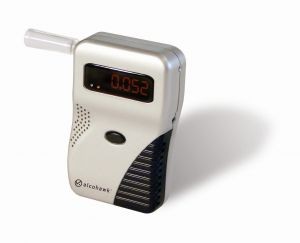A vehicle ignition interlock is a device that some states require to be installed on the cars of repeat drunk driving offenders. The device consists of a breath test tube in which the driver must blow before starting the vehicle.
 Originally, alcohol interlock devices were only used prior to starting the car. However, it became apparent that many intoxicated drivers were having a sober person blow into the tube, so they could start the car before driving away. This is what prosecutors call a “blow and go.” Now, the device can alert the driver at any time, and he or she is required to blow into the tube again to keep the car running. There were many who were concerned this could result in a serious danger to the driver if his or her vehicle shut down in a unsafe location and would not restart, but the companies manufacturing the devices say they have designed their respective systems say they were made in a way that will not occur.
Originally, alcohol interlock devices were only used prior to starting the car. However, it became apparent that many intoxicated drivers were having a sober person blow into the tube, so they could start the car before driving away. This is what prosecutors call a “blow and go.” Now, the device can alert the driver at any time, and he or she is required to blow into the tube again to keep the car running. There were many who were concerned this could result in a serious danger to the driver if his or her vehicle shut down in a unsafe location and would not restart, but the companies manufacturing the devices say they have designed their respective systems say they were made in a way that will not occur.
As our Boston drunk driving accident lawyers have seen, not every state requires the use of an alcohol interlock device, and driver from a state not requiring the devices can travel into the Commonwealth of Massachusetts and cause a drunk driving accident. For this reason, a national law would go a long way in preventing such a situation, and Congress can accomplish this through the use of its power to regulate commerce across the United States.
According to a recent news article from the Brooklyn Daily News, Senator Chuck Schumer (D-New York) has co-sponsored a new piece of legislation that would require alcohol ignition interlock devices (IIDs) on vehicles operated by repeat drunk driving offenders across the country.
The focus of the proposed law, called the ROADS SAFE act, is aimed at providing direct funding for the alcohol detection interlock devices. Funding for the devices is one of the major problems preventing more widespread implementation under state law. The laws often require people to get the device from an approved installer at their own cost, and these devices can cost hundreds of dollars. The driver must then pay to have the device monitored at cost of between $50 and $100 per month on average, and this is not something most repeat drunk drivers are able to do.
While many would argue that these people should not be on the roads anyway, and if they cannot afford an IID, that is their problem, there are a variety of other laws and social policy considerations that make this approach difficult in implement in many states. With the ROADS SAFE Act, congress would allocate $6 million per year through fiscal year 2021 to subsidize the cost of alcohol interlock technology.
Again, while many may oppose spending tax payer money to subsidize an expense incurred by drunk driving offenders, any reduction in the amount of intoxicated drivers out on the roads mean less personal injury and less loss of life on the streets and highways of America.
If you have been injured in a Boston drunk driving accident, call for a free and confidential appointment at (617) 777-7777.
Additional Resources:
Schumer says technology can stop drunk drivers, By Paula Katinas, Brooklyn Daily News
More Blog Entries:
MADD Working with NFL Teams to Curb Drunk Driving, July 11, 2014, Boston Drunk Driving Accident Lawyer Blog
 Boston Drunk Driving Accident Lawyer Blog
Boston Drunk Driving Accident Lawyer Blog

